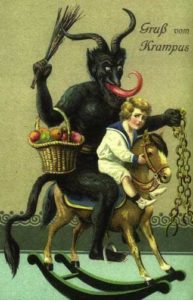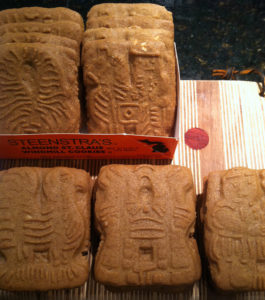The 6th of December brings St. Nicholas’ Day, but the 5th brings the Eve of St. Nicholas, the traditional night when St. Nick delivers presents to children in the lands where he is loved… especially Germany, Austria, Northern Italy, and the Netherlands. He is the first of the midwinter gift bearers, wending his way through these darkest nights.
On the Eve of St. Nicholas, the old bishop will make his rounds. Wise children will place their shoes by the chimney before going to bed in hopes that St. Nicholas will fill them with gifts. They’ll set out carrots and hay for his donkey. If they’ve been good, they might wake up on St. Nicholas’ Day to find their shoes filled with fruits and nuts and sweets and small toys. But St. Nicholas does not wander alone; he travels tonight with a dark companion. The companion goes by many names, depending on the region––Knecht Ruprecht, Black Peter, Pelznickel… but he is best known as Krampus: half man, half goat, horned and furry, with an astonishingly long tongue. St. Nicholas, dressed in his bishop’s robes and hat, concerns himself with the good children. Krampus deals with the naughty ones. He carries chains or birch switches and oftentimes a sack, in which he gathers up the bad children who deserve nothing more than to be carried away. It’s a bit terrifying, but also good fun––especially in the Krampusnacht parades that feature both St. Nick and Krampus.
I love the time of the Midwinter gift bearers. Such a beautiful way to make these darkest nights somewhat less dark (despite Krampus). St. Nicholas will be followed over the next few weeks by the Christkindl, by Santa Lucia, by Father Christmas and Santa Claus, by los Tres Reyes (the Three Kings) and a kind old witch named Befana who will sweep away the remnants of the Christmas season in early January.
But that’s all a long ways away. For us tonight here in this little old house in Lake Worth, we will leave our shoes by the bed, which we always do. Our small old home has small old closets, and so we almost always have a couple of pairs of shoes outside the closet––there’s just no place in the closet to put them. I don’t know if St. Nicholas and Krampus will make their way this far from Europe, but chances are good that once we go to bed, Haden the Convivio shop cat will spend some time hunting down her little stuffed animal toys––in particular, Cat in the Hat––carrying them about and making the odd cries that cats make once they have caught their quarry, and maybe tonight she will drop one of them into someone’s shoe, as she is wont to do so many nights. But before those magic overnight hours, we will brew ourselves some tea, or maybe some mulled wine, and we will for sure open a package of Steenstra’s St. Claus cookies, like we do each year on this night. The cookies are speculaas, a type of Dutch cookie made for St. Nicholas’ Eve. They sell them all year long at the Publix bakery in a small cellophane-wrapped package. The cellophane is clear and the box inside is bright orange. The Steenstra family emigrated from the Netherlands to Michigan in 1926, and that’s where the cookies are still made, as they have been for about 90 years now. They taste of almond and warm spices like ginger and clove, and they depict five different scenes about St. Claus (more correctly about St. Nicholas of Myra, the kind fourth century bishop who gave gifts to the poor while they slept). There is St. Claus on a horse (a derivation of that donkey), a boy and a girl (because they like to receive presents from St. Claus), a rooster (because St. Claus starts his day at sunup), an owl (because St. Claus works til sundown), and a windmill (because St. Claus lives in a windmill).
So whether you be visited by St. Nicholas or by Krampus, or by a cat that drops presents in your shoes, tonight something special is bound to happen. Enter the gift bearers onto the midwinter stage––there is good reason to celebrate this night.
Today’s chapter is a reprint of one published on December 5, 2019. It’s been a heck of a week here and the Eve of St. Nicholas has completely snuck up on me. It’s ok; these things happen. I did, however, just check the Publix delivery option for Steenstra’s St. Claus cookies and they did not come up… and so I may have to venture into the store myself to see if they are there. We do have wine, though, and we are stocked up with mulling spices. In fact, we use mulling spices so often during these midwinter nights, you may want to be stocked up with them, too. Here’s a direct link to the Shaker Mulling Spices we sell at our catalog. If you’re local and need some, order using the discount code PICKUP at checkout, which will deduct the $8.50 shipping charge, and I will bring them by to you if you live in the 33460 zip code, or you can come by here for a front porch pick up.
Images: Steenstra’s St. Claus cookies. At the top, a late 19th century or early 20th century Krampusnacht postcard from Germany.


Thank you so much for this, it has given me the aural link between Santa Claus and Saint Nicholas! How did I never hear this before, or did I, and forget? Ah well, it makes me happy whether to know it or to know it again, no matter. Joy to all!
Joy to you and Kathy, too! And who can explain these things? I am pretty sure our American Santa Claus is derived from the Dutch Sinterklaas, who definitely looks more like St. Nicholas in his bishop’s robes. I can’t say I’ve ever heard of St. Claus either, before we found those Steenstra’s cookies. Either way, Seth and I are happy to eat the cookies with our mulled wine and we are happy to welcome him as the first of the midwinter gift bearers.
The sad news is I indeed did stop in at the market yesterday, for the first time in person since March, and found no Steenstra’s at the bakery there. But good news emerged… on our Facebook page, someone posted a site of recipes for Dutch cookies for this time of year. I think we may be making some belated ones as soon as we have a chance, in honor of St. Claus.
So good to hear from you, Graham. Merry Christmas.